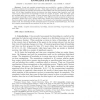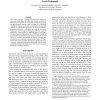1634 search results - page 4 / 327 » Reasoning about Knowledge Using Rough Sets |
ATAL
1997
Springer
13 years 11 months ago
1997
Springer
Abstract. Just as cooperation in multi-agent systems is a central issue for solving complex tasks, so too is the ability for an intelligent agent to reason about combined knowledge...
ASIAMS
2007
IEEE
14 years 2 months ago
2007
IEEE
This talk has two parts explaining the significance of Rough sets in granular computing in terms of rough set rules and in uncertainty handling in terms of lower and upper approxi...
CORR
2002
Springer
13 years 7 months ago
2002
Springer
Sound and complete axiomatizations are provided for a number of different logics involving modalities for knowledge and time. These logics arise from different choices for various ...
KR
2004
Springer
14 years 1 months ago
2004
Springer
This article presents a general framework for integrating reasoning about object structure and concept taxonomies. The structural relations in the domain of objects discussed are ...
RSCTC
2000
Springer
13 years 11 months ago
2000
Springer
This paper introduces a neural network architecture based on rough sets and rough membership functions. The neurons of such networks instantiate approximate reasoning in assessing ...


